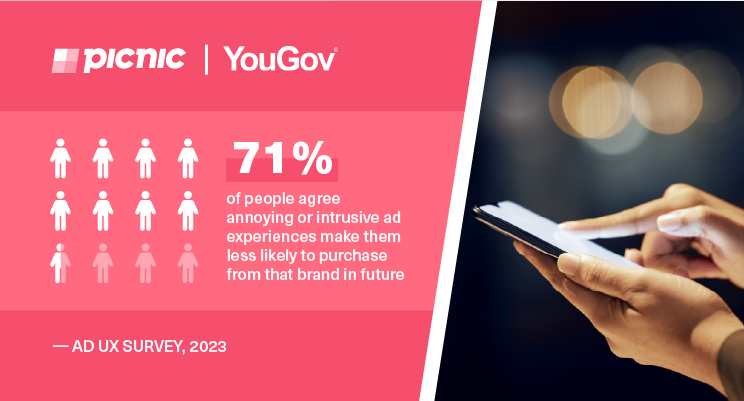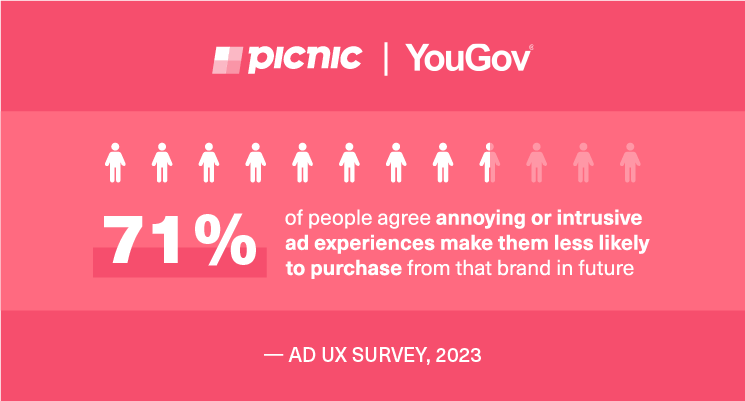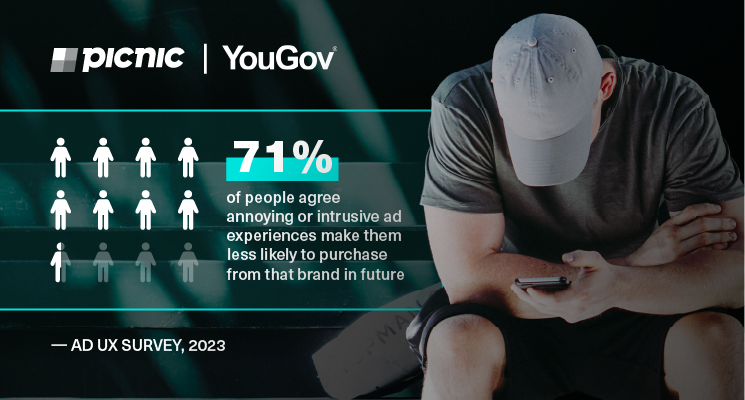Brands Are Wasting Budget on ‘Annoying’ Ads That Do More Harm Than Good, New YouGov Survey Finds
YouGov/Picnic UX survey shows 70% of people find digital adverts annoying – and that bad user experience is doing real damage to brands
More than two-thirds of people (70%) find digital advertising annoying and unpleasant, while 72% say that bad advertising experiences have negatively affected their perception of a brand, according to new research that lays bare the real damage caused by excessive and intrusive ads.
The survey, from user-first media platform Picnic, in partnership with global public opinion company YouGov, shines a light on attitudes towards user experience of advertising on the ad-funded web – and reveals that poor advertising experiences not only achieve diminishing returns, but actively turn consumers off infringing brands.

71% of people agree that annoying or intrusive ad experiences make them less likely to purchase from that brand in future, while 86% say that too many ads on a webpage make them feel overwhelmed and more likely to ignore the advertising altogether. Survey respondents identified ‘too many ads’ as the number one most annoying UX issue, followed by blocked screen content, accidental clicks, slow load speeds, and unstable page content, in that order.
Recommended AI News: Sarcos Pivots to Robotics AI Software Near-Term Opportunity
For users who chose to comment on ad experience issues, there was a resoundingly negative attitude towards digital ads in their current form, with all answers expressing negative sentiment. Comments included ‘all advertising is annoying’ and ‘[ads are] annoying full stop’. Some users also confirmed they use ad blockers to avoid UX issues.
![YouGov survey - Image 1]()
![YouGov survey - Image 2]()
![YouGov survey - Image 3]() Hope for the ad-funded web
Hope for the ad-funded web
Despite these negative attitudes, respondents are still fundamentally in favour of an ad-funded web. The majority of respondents (56%) agree that they enjoy reading free content from reputable publishers, and over a third of people (39%) say they like discovering new products and brands on the open web. Importantly, 71% of participants also said they’d be more likely to feel positively towards ads if they were fast-loading, and didn’t force clicks or block content.
Commenting on the survey, Matthew Goldhill, Founder & CEO, Picnic, says: “If brands and media planners can shift their approach towards prioritising ad solutions that resolve user experience issues on the web, we as an industry can drastically reduce the amount of ineffective, wasted and even damaging ad spend. This would not only be better for the environment, but would also help to drive more meaningful engagement and returns for brands.”
Sean Golding, Digital Development Director, AKA UK, agrees: “Minimising wasted ad spend is a top priority in terms of efficiency and brand safety. To prevent waste and increase engagement, we need to find ad solutions that deliver a positive user experience on trusted, high-quality publishers.”
Recommended AI News: Dell Technologies and Hugging Face to Simplify Generative AI With On-Premises IT
Golding continues: “It’s a win-win for all. Advertisers will see improved campaign performance, and publishers will benefit from delivering ads that do not ruin their on-page content – keeping their readers engaged and coming back for more.”
Key highlights from the survey:
- 70% of people find digital ads annoying and unpleasant
- 72% agree that annoying or intrusive ad experiences have negatively affected their perception of a brand
- 66% say annoying or intrusive ad experiences reduce their trust in the brand advertising
- 71% agree that annoying or intrusive ad experiences make them less likely to purchase from that brand in future
- 86% of people agree that too many ads on a webpage makes them feel overwhelmed and more likely to ignore the adverts
- 71% of people agree they’d have a more positive perspective of digital ads if they loaded quickly and didn’t force clicks or block content
Recommended AI News: Vodex 2.0: The Next Big Thing in Generative AI Innovation
[To share your insights with us, please write to sghosh@martechseries.com]



 Hope for the ad-funded web
Hope for the ad-funded web






Comments are closed.